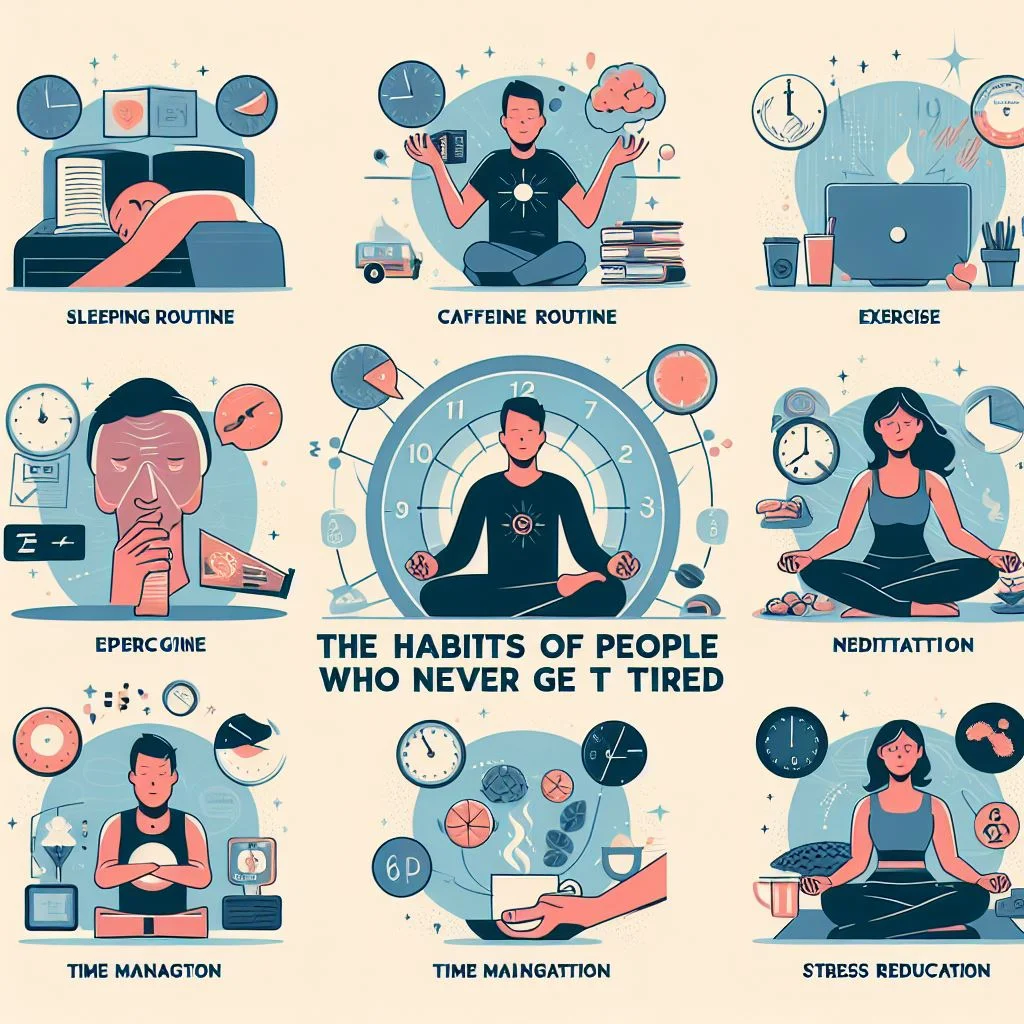The Science of Lasting Vitality: Expert Insights on 8 Lifestyle Habits for Endless Energy
Think back to childhood habits like summers filled with care free days biking around the neighborhood, swimming at the pool, staying up late to catch fireflies. Do you remember how you’d collapse into bed utterly exhausted yet sleep soundly until 10am? Then wake feeling fully recharged for another lively day of play?
Somewhere along the path to adulthood, many lose touch with that effortless rhythm where vibrant energy ebbs and flows in alignment with body cycles. Packed work and family schedules disrupt sleep. Fast food grabs replace nutritious meals. Stress and loneliness accumulate. Before long, getting through daily obligations feels like an uphill battle.
Yet, reclaiming resilient wellbeing is possible at any age through science-supported lifestyle adjustments tailored to your needs. Read on for guidance from doctors and health researchers on eight pillars that distinguish the lively from the leaden. Small dedicated steps towards optimal nutrition, physical movement, mental relaxation and social connectivity compound over time for substantial gains.
Why Some People Buzz With Energy While Others Barely Survive the Day
According to neurologist and sleep medicine specialist Dr. Josna Adusumilli of Harvard Medical School, the differentiation between the ever-exhausted versus the enduringly energetic largely boils down to biological self-care.
As she clarifies, “At the core of chronic fatigue is failure to adequately fuel the body, move it appropriately, rest it sufficiently, nourish the mind positively, and connect socially.”
When these fundamental health needs go unmet for long periods, symptoms of deterioration appear – difficulty concentrating, digestive issues, frequent illnesses, joyless moods. But those who structure days to align with innate rhythms enjoy deeper reserves across mental, physical and emotional dimensions.
Positive psychologist Dr. Greg Henriques, professor at James Madison University, agrees weekday choices greatly impact weekend vitality:
“Prioritizing good nutrition, sufficient sleep, relationships and regular recreational pleasures minimizes that dragged-out sense so many experience by days’ end. Energy spent aligning lifestyle with natural biorhythms gets returned exponentially in optimal wellbeing.”
Below we review eight science-backed energy pillars distinguishing the enduringly energetic. Consider which habitual changes hold most transformative potential for you currently. Remember progress not perfection is key when cultivating lifestyle medicine for optimized functioning.
Nutrition Fundamentals: What to Eat and Drink for All Day Energy
Leading reasons people experience the afternoon slump? Poor meal planning leading to blood sugar spikes and inflammation buildup depleting cellular fuel.
Assistant Clinical Nutrition Professor at Tufts University Dr. Dariush Mozaffarian confirms healthy dietary foundations prevent fatigue onset:
“Symptoms like difficulty concentrating, irritability, cravings, brain fog, and head/body aches signal nutritional inadequacy. Ensuring sufficient calories, hydration and nutrients at consistent intervals sustains energized physiology.”
Follow These Dietary Tips:

1. Eat enough calories for your age, gender, activity level so organs aren’t underfueled for their relentless metabolism, respiration, circulation, and filtration roles keeping you alive.
2. Consume a spectrum of whole foods – flavonoid and antioxidant-rich fruits, fiber and phytochemical-packed vegetables, satisfying proteins, healthy fats and minimally processed grains to power optimal respiratory metabolism.
3. Stay hydrated with 64+ fluid ounces (more if active) to enable circulatory transport of energizing nutrients and oxygen throughout the body.
4. Moderate protein at meals with 20-30 grams per meal to maintain an even supply of amino acids for sustained blood glucose rather than sharp ups and downs.
5. Listen to internal hunger/fullness signals and avoid mindless eating. Refuel moderately when sensation of true appetite arises every few hours.
As Dr. Mozaffarian concludes, “Setting this whole foods dietary foundation preventatively ensures adequate nutrients reach the trillions of cells working 24/7 to keep you healthy, reducing that heavy physical and mental fatigue some constant battle.”
Physical Activity Science: How to Use Exercise to Combat Fatigue
While nutrition provides the body proper materials for energy generation, exercise delivers that fuel to tissues needing it most. What’s the bare minimum movement needed for staying alert and energetic?

Johns Hopkins University sports medicine professor Dr. Neeru Jayal recommends:
“Most health bodies suggest at least 150 minutes per week of moderate aerobic activity like walking or cycling plus twice weekly strength training for adults. But studies show even basic short daily movement substantially slashes fatigue.”
Here’s an overview of helpful exercises:
1. Aerobic cardio sustained for at least 10 minutes accelerates your heart rate into fat burning mode. Do a daily 30-60 minutes walk, bike ride, dance session or other activity you enjoy that gets you lightly sweating. This pumps freshly oxygenated nutrient-rich blood flowing to organs leaving you renewed.
2. Strength training triggers your sympathetic nervous system’s ‘fight or flight’ response, giving an adrenaline rush to power through daily stressors without depletion. Try bodyweight squats, planks, lunges, pushups 2-3 times weekly.
3. Stretching activities like gentle yoga help muscles relax while also enhancing mindfulness around bodily cues for when you actually need rest. This prevents overexertion and burnout.
4. Build incidental activity into days even if formal workouts aren’t possible by taking the stairs, walking meetings, parking farther away, setting hourly movement reminders. It quickly compounds for revitalizing benefits.
As Dr. Jayal concludes, “Staying continually active not only reduces risk for various lifestyle diseases down the road, but serves as potent preventative medicine against fatigue buildup each day – spurring productivity and brighter outlook right away too.”
The Restorative Science Behind High Quality Sleep
Ever pull an all-nighter to meet a deadline or stay out late partying only to feel utterly demolished in days following even after catching up on sleep? That’s because without adequate consistent nightly rest, restorative processes vital for feeling physically energized and mentally focused go haywire.
Stanford University Research and Sleep Medicine Professor Dr Rafael Pelayo notes getting sufficient sleep proves more critical than diet or exercise regimes:
“While other pillars like nutrition and movement certainly enhance fatigue resilience day-to-day, none can compensate for deficits accumulating from inadequate or dysregulated sleep over weeks.”
Getting 7-9 hours each night should be non-negotiable. Here’s how:
1. Maintain a consistent bed/wake schedule: Keep strict weekends too – only adjust by 1 hour max. Consistency regulates hormones for easier sleep onset.
2. Develop a constructive evening wind-down routine: Dim lights, avoid digital stimulation, take baths, read, meditate to cues rest phase.
3. Use blackout curtains and noise makers: Ensure room is pitch black and quiet if needed so sleep is uninterrupted.
4 Allow daytime 20 minute power naps: Ideal cognitive refreshment without disrupting night patterns.
As Dr. Pelayo emphasizes, “Optimizing sleep should be priority one since nearly all biological systems depend on nightly repair and restoration enabling next day vitality. Master this before attempting any other demanded life improvements.”
Brain Boosting Mental Activities: Engage Your Mind to Stay Sharp
Fail to challenge your mind and it more easily grows dull. Practicing cognitively stimulating hobbies keeps the brain constantly producing fresh connections and neurotransmitter chemicals preventing mental exhaustion.

As University of Texas neurobiology professor Dr. Theresa Desiree explains:
“Pursuing continual learning in areas meaningful to the individual enhances energy via engagement, excitement, skill development, confidence and socialization. Deliberate practice sparks growth of neural networks making even mundane tasks feel effortless.”
Sample mentally engaging activities:
1. Take free online courses on sites like Courera, edX, Khan Academy. Add one interesting class weekly.
2. Play brain training computer/app games like Lumosity, Peak, Elevate. Or classics like Sudoku, crosswords, Tetris.
3. Learn or practice musical instrument: Neuroplastic benefits well established. Try guitar, keyboards, harmonica.
4. Read fiction or nonfiction aligning your interests: history, biography, mystery novels. Digest longform journalism, podcasts. Local library access offers endless content.
5. Attend community classes on everything from gardening to arts to wine tasting. Lifelong learning institutions also engage mature students.
Keeping your mind challenged prevents it from perceiving tasks as depleting chores. Neuronal novelty powers motivation.
Sensory Modulation Science: Prevent Overload by Simplifying Environmental Stimulation
While seeking beneficial novelty, too much mental stimulation overwhelms cognition bandwidth contributing to drained feelings by day’s end. Finding balance by moderating digital inputs and simplifying physical environments allows optimal functioning.
Pepperdine clinical psychology professor Dr. Susan Hall specializes in technology’s mental health influence. She advises tactically minimizing information overload:
“From social media to 24/7 global news to overflowing email inboxes, too much data intake perpetuates stress response keeping us in a depleted state. Set boundaries around digital engagement and consciously design soothing living/working spaces to prevent fatigue.”
Follow these tips:
1. Digital detox – Mute non-urgent phone notifications. Schedule specific blocks for checking emails, social media. Abstain 1 day a week. Be strict to prevent addiction reward circuitry hooks.
2. Declutter physical spaces – Pare down possessions to essentials. Tidiness helps mental clarity. Evaluate whether your schedule truly serves your values vs scattered exhaustion.
3. Incorporate natural elements – Open windows for fresh air, display plants and flowers, diffuse calming essential oils. Meditative music lowers cortisol too.
4. Adjust lighting – Use warm bulbs at night, maximize sunshine exposure during day. Bright harsh overhead lighting strains the senses.
As Dr Hall concludes, “While we cannot fully control external sensory stimulation bombarding us daily, deliberately structuring environments for serenity ensures nervous system recovery preventing that frazzled state.”
Social Connection Science: How Meaningful Relationships Energize Us
Humans require community on fundamental biological levels. Isolating deprives oneself of vitalizing oxytocin release combating cortisol burnout. Seeking mutually supportive social bonds and greater purpose energizes you through all of life’s ups and downs.
Acclaimed sociologist Dr. Brené Brown’s extensive research on human motivation identifies why relationships and belonging determine thriving:
“Chronic disconnection from others creates worry impeding cognitive performance as the mind constantly seeks threats. But feeling heard, seen and understood – especially through life’s struggles – unleashes one’s greatest gifts. Shared meaning inspires.”
Ways to foster social wellness:
1. Check in regularly with close friends – even briefly via text if schedules conflict. Voice fears to loved ones who validate you.
2. Attend group classes for enjoyable hobbies. Don’t isolate. Share your journey.
3. Join local or online communities where you feel aligned in values and interests. Volunteering gives purpose too.
4. If new to an area or lacking nearby support, use MeetUp.com to find those welcoming newcomers to engage with.
As Dr. Brown reassures, “The courage to show up openly and emotionally connect with others who hold safe space for mutual growth delivers the meaning and vibrancy we all deeply desire from this shared life.”
Final Analysis – Small Adjustments Create Big Impacts
The eight science-supported lifestyle medicine categories above distinguish why some individuals overflow with enduring energy while others constantly struggle feeling drained.
Keep in mind that progress in even one or two dimensions still powerfully anchors better baseline functioning. Then positive momentum gains.
Maybe set a reminder to meal prep nutritious grab and go snacks to maintain steady nutrients. Or block nightly work emails after 8pm to prevent anxious mental stimulation sabotaging sleep consistency.
Transform relationships by texting a long lost friend that you’re thinking of them. Or explore a new hobby attending public classes transporting you to focus and flow states.
Whatever first step resonates as self-care, trust the incremental yet profound improvements to your mental sharpness, physical stamina and emotional resilience accumulating over time. Your vitality journey has just begun!

